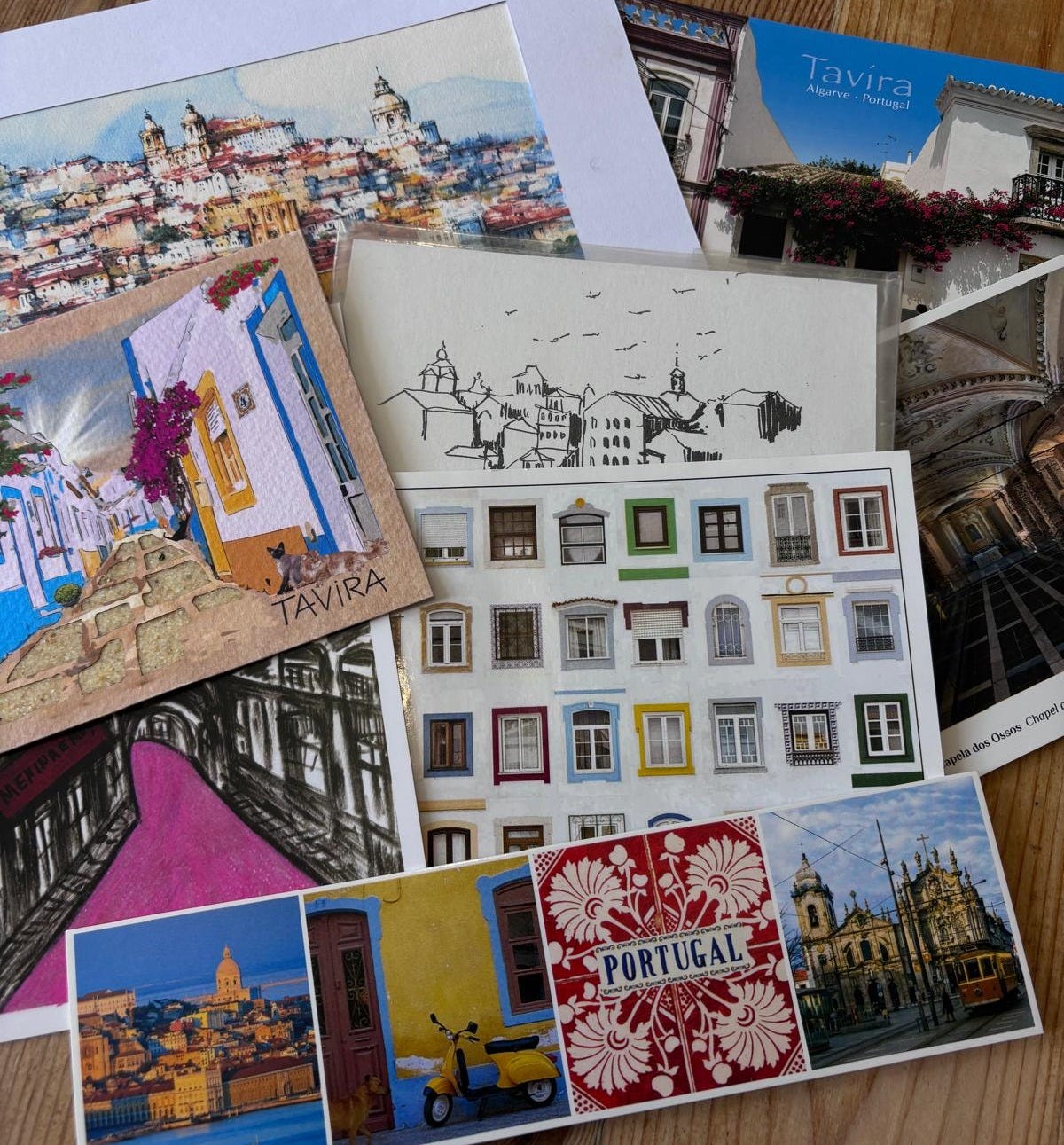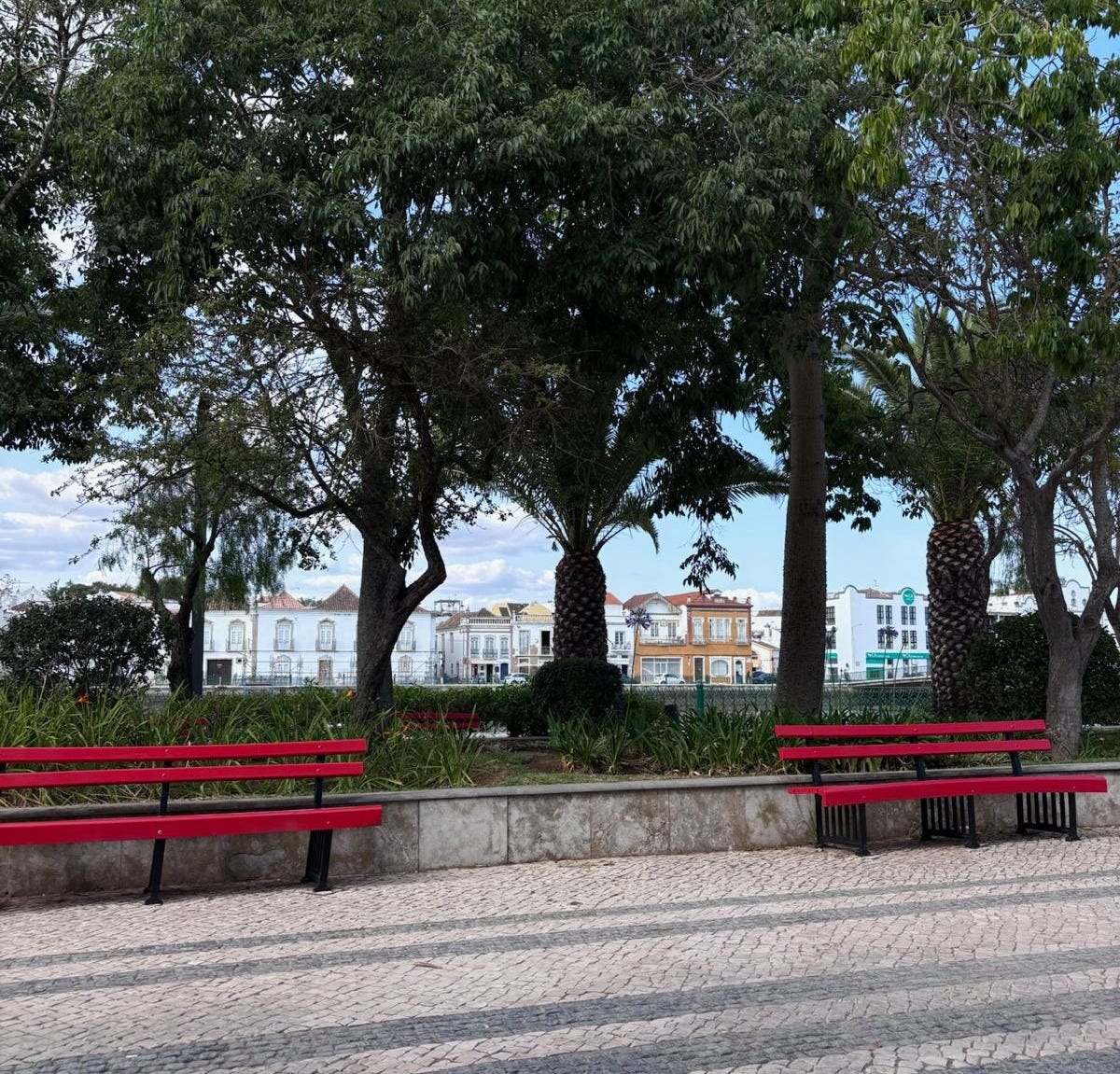Portugal begins, for me, in a bookstore. Not by accident. But not quite by intention, either. In Porto, the queue spills down the stone steps like something holy — pilgrims with day passes, waiting not to buy but to see. Inside, the staircase curves like a velvet tongue, and the ceiling reads like a prayer. Livraria Lello has been declared the most beautiful bookshop in the world. This is not in dispute. What is in dispute — and frequently, on TripAdvisor — is whether it’s worth it.
It depends what you mean by worth. If you want a quiet moment with Pessoa, probably not. But if you want to feel what happens when a country remembers that language is spectacle — then yes. It is worth it. You will not hear yourself think. You will see every book treated like a relic. But you’ll also see a bookstore that has learned to survive by becoming a museum of itself. Which, in its own way, feels honest.
Portugal is a country of hyperbole. The best fish. The best fruit. The most churches. The clearest sea. And somehow, the statements always feel earned. Or if not earned, at least believed. There’s a sincerity to the excess — as if understatement would be a kind of lie.
From Porto to Coimbra the roads coil gently, pulling you past small towns named for saints and rivers. The colors shift: green, then gold, then a kind of dry silver where the olive trees press low to the earth. The towns are not quaint. They are working. You pass the tiled façades and think “postcard,” but there’s laundry hanging from the window and someone welding in the alley. The beauty is incidental. The work is primary.
Portugal resists summary. You don’t write about it so much as move through it — roundabout to roundabout, city to sea. A panorama, not a portrait. And if it feels like too much, that’s part of the point.
In Nazaré, the cliffs fall off the edge of the world, and the tourists pose where the fishermen once stood. The waves are famous — hyperbolically so. World records. Jet skis. Surfboards like crosses. But when I arrived, the water was flat, glassy, almost bored with itself. A town used to being photographed. A town with no need to impress — but quick to issue a €150 fine if you park on the wrong bit of curb. The ticket was precise. The signage, less so. I’m told this is part of the charm.
Inland, in Évora, there is a chapel lined with bones. Skulls, femurs, spines — stacked in rows, fitted into arches, arranged with quiet precision. A library with only one subject. Above the entrance, an engraving: Nos ossos que aqui estamos pelos vossos esperamos. We bones that are here, await yours. It’s surreal, yes, but also strangely calm. The space doesn’t demand reverence so much as resignation. This, too, is part of the architecture. The ornate has always made room for the inevitable.
Somewhere between Évora and Lisbon, the storks take over. Not a few, not a dozen — but hundreds. Each one balanced on a high-tension tower, their nests massive, intricate, prehistoric. Not perched but claimed. The metal arms vanish beneath twig and bone, steel consumed by brush. For miles, the landscape looks half-postcard, half-Jurassic. You expect the birds to shriek or take flight, but they don’t. They stay. Still as statuary. Watching the cars pass with the detached patience of ancient things. Like traffic is something that happens to the world, not part of it.
There’s a smell in the air — warm metal, maybe. But also salt. Even here, inland. Even here, where the sea is only implied.
Portugal is a country of roundabouts. This is both geographic and philosophical. You will drive in circles. You will exit too soon. You will re-enter. There’s no shame in it. No hurry, either. You’ll see the same gas station twice and the same old man sitting outside it, still watching, still waiting for something worth getting up for.
In every town square, there are groups of men — some very old, some almost boys — sitting together like they’ve done so every afternoon since the invention of futebol. They argue, not out of anger, but necessity. As if the performance of opinion were an art in and of itself.
At a restaurant called Casa da Avó — Grandmother’s House — there are seven items written in shaky chalk on a board leaning against the wall. Grandmother takes your order. Grandmother brings your drink. Grandmother tells you, rapidly and without apology, that these are the best duck eggs in Portugal and anyone who says otherwise is either lying or Spanish. Then she disappears. You don’t ask when your food will come. You wait. The eggs, when they arrive, are perfect.
In Lisbon, nothing is flat. The city lifts and folds like fabric. You walk through narrow streets of old stone buildings and see nothing but more buildings — until, suddenly, there’s the sea. Always somewhere you weren’t expecting it. A bright blue interruption.
The streets are tiled but slippery, polished by centuries of steps and too many small rains. You learn quickly to walk carefully, like you’re trying not to offend the ground. Everything feels uphill. Even the downhills feel uphill. But you keep going. There are jacaranda trees blooming in purple disbelief, and bursts of tilework so sudden and intricate they feel like graffiti left by someone with a secret.
At meals, the olives come first — plump, marinated, not asked for but always welcomed. The waitress in Cascais tells us we must go in the water. “You can’t come all this way and not go in,” she says, not unkindly. “Just lift your skirts. Go.” So we do. The water is so clear it almost isn’t there. But it is. Of course it is.
There are seagulls overhead. Salt in the breeze. Someone has hung a bright yellow shirt from a window five stories up, and the sun has made it shine like gold. Lisbon isn’t showing off. It just happens to be beautiful.
The people are helpful. Friendly. Present. Like they’ve lived here a long time and still think it’s worth it.
By the time you sit down with your plate of grilled sardines and your small glass of white wine, you’ve stopped arguing with the hyperbole. It’s not performance. It’s personality. The country doesn’t exaggerate. It simply commits.
And anyway, the fish really is that good.
Come With Me
You’re sitting beside me on a sun-warmed bench in Tavira. It’s late afternoon. The light is gold but not romantic. Just gold. There’s salt in the air and coffee in your hand — bitter, no milk. In front of us, three generations of men are locked in debate over something that appears to be futebol but might also be philosophy. Their hands do more talking than their mouths.
To our left, an alley curves behind a chapel. Someone is hanging laundry from a window that opens too wide. A child kicks a ball against a stone wall. The ball wins. You’ve just realized your parking ticket will cost more than lunch.
You try to describe the color of the buildings — white, yes, but not one white. Some of it chalky. Some of it glazed. Some of it the color of paper left too long in the sun.
You’re not here for a photograph. You’re here to pay attention.
You don’t need a pen. Not yet.
Let the dust settle. Let the bells ring once.
Let the sentence come when it’s ready.
Now — let’s write.
Mini Workshop: The Art of Stating It Plain
Portugal doesn’t exaggerate. It just commits.
The fish is the best. The fruit is the sweetest. The duck eggs are perfect. You’re told this without irony or evidence. The phrase isn’t dressed up. It’s just delivered — cleanly, confidently, as if no other reality could possibly exist. And oddly enough, you believe it.
Good writing works the same way.
Writers often worry they have to justify their sentences. Layer in backstory. Earn every adjective. But sometimes the most powerful thing you can do is state it plain — and stand behind it. Don’t hedge. Don’t wink. Don’t use “almost” or “perhaps” to soften your certainty. If the fish was the best, say so. If the girl on the tram broke your heart, say that, too.
But here’s the trick: conviction without inflation.
The sky was beautiful.
The church was vulgar.
The man was lying.
The road curved like a question you didn’t want answered.
These sentences don’t explain themselves. They simply arrive. And their strength is in their footing. They don’t try to seduce you. They just tell you what they’ve seen.
This is a craft choice — not to persuade, but to declare. The writing becomes believable not because it gives you proof, but because it offers itself with so much clarity it can’t be dismissed.
When you revise a paragraph this week, look at each sentence and ask:
Am I stating what I mean, or padding around it?
Am I hedging with qualifiers I don’t need?
Could this be sharper, firmer, truer — just by being simpler?
Strip the sentence back. Let it stand. Let it wait, like the bones in the chapel. Let it stay upright, like the stork on the tower. Let it be what it is — and nothing else.
Invitation to Play: Say the Thing
Write a sentence that’s truer than it should be.
Not lyrical. Not clever. Just… honest.
Maybe it’s about the eggs. Maybe it’s about the afternoon light. Maybe it’s about the feeling of being somewhere unfamiliar and realizing it suits you. Write the thing you’d normally step around — but don’t explain it. Just say it.
Then write another. And another.
Each one a single sentence. Each one standing on its own like a roadside stork.
Write five if you like. Or twenty.
If you hesitate, write the sentence you almost said.
If it feels wrong, you’re probably close.
You don’t need a setting. You don’t need a shape. Just trust the weight of the thing.
Sometimes the most startling line is the one you almost didn’t let yourself write.
About Me
I’m the sort of writer who likes deadlines and resents them. I believe in coffee more than clarity. I’ve written Flash, CNF, short fiction, and longer fiction, taught classes, and led workshops, but I still get nervous about opening a blank page. I think white space is a kind of genius. I think you are not wrong for hesitating.
This summer series is for you — if you write, want to write, or need to be reminded that art can begin in small, defiant scraps. I’ll be writing from the road, from café tables and slow trains and sun-warmed stone steps. You can write from wherever you are.
You’re already here. That’s enough.








I love your descriptive writing so much, Rena. I love how I can see the calmness of the sea and feel that parking ticket as if it's my own hand! What a beautiful experience you are having. I thank you for sharing it.
Wow, Rena,
Thank you for bringing us along so vividly! I've been to some of the places you mention, including the bookstore in Porto with a longer line than Space Mountain at Disneyland on a summer Saturday. I'm happy you're having such a rich adventure.